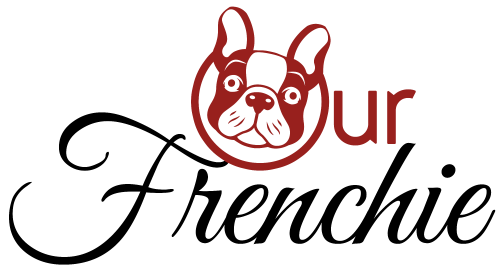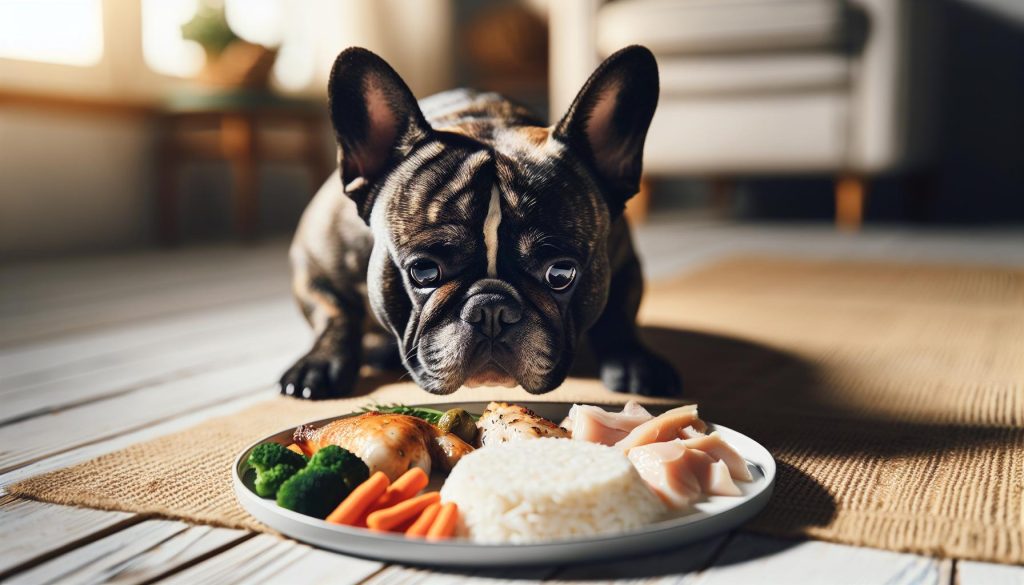About
Can French Bulldogs Eat Human Food?
Page Contents
French Bulldogs are beloved companions known for their playful personalities and unique appearances. As pet owners, it’s natural to wonder if these charming canines can safely indulge in human food. While the temptation to share a snack with your furry friend is strong, it’s crucial to understand which foods are safe and which could pose health risks. This article delves into the dietary considerations for French Bulldogs, exploring the do’s and don’ts of incorporating human food into their diet, ensuring your pet remains healthy and happy.
Safe Human Foods for French Bulldogs
- Carrots: A crunchy, low-calorie snack that is excellent for dental health. They are packed with vitamins and antioxidants which support a healthy immune system.
- Apples: Remove the core and seeds, and you have a sweet treat rich in vitamins A and C.They also provide dietary fiber, which aids digestion.
- Chicken: Cooked chicken without seasoning is an excellent source of protein. It supports muscle growth and provides essential nutrients without the risk of harmful additives.
- Rice: Plain, cooked rice is gentle on the stomach and can be a good option for dogs with digestive issues.it’s a great source of carbohydrates and energy.
- Peanut Butter: In moderation, this is a delightful treat that provides healthy fats and proteins. Ensure it is free from xylitol,which is toxic to dogs.
- Blueberries: These tiny fruits are a powerhouse of antioxidants and vitamins. They are a perfect bite-sized snack that supports brain health and overall well-being.
Always introduce new foods in small amounts to monitor for any adverse reactions. While these foods are generally safe, every dog is unique, so consult your veterinarian for personalized advice.
Foods to avoid for French Bulldogs
- Chocolate: This sweet treat is toxic to French Bulldogs due to the presence of theobromine,which can lead to serious health issues such as heart problems and seizures. Even small amounts can be harmful, so keep all chocolate products out of reach.
-
Grapes and Raisins: While they may seem like harmless snacks, grapes and raisins can cause rapid kidney failure in French Bulldogs. Symptoms of toxicity include vomiting, lethargy, and loss of appetite, so it’s best to avoid them entirely.
-
Onions and Garlic: These common ingredients contain compounds that can damage red blood cells in dogs, leading to anemia. Whether raw, cooked, or in powdered form, onions and garlic should be kept away from your French Bulldog’s diet.
- Avocado: The persin in avocados can be toxic to dogs, causing vomiting and diarrhea. Additionally, the fruit’s high-fat content can lead to pancreatitis in French Bulldogs, making it a food best left off their menu.
-
Alcohol: Even small amounts of alcohol can be perilous for french Bulldogs, causing symptoms like vomiting, coordination problems, and even respiratory distress. Always ensure that alcoholic beverages are stored safely away from your pet.
It’s crucial to be vigilant about what your French Bulldog consumes.While they may give you those irresistible puppy eyes, prioritizing their health by avoiding these foods will help ensure they stay happy and healthy. Always consult with a veterinarian if you’re unsure about a specific food item.
Nutritional Needs of French bulldogs
French Bulldogs, like all dogs, have specific nutritional needs that ensure their health and well-being. These small, muscular companions require a balanced diet rich in proteins, fats, carbohydrates, vitamins, and minerals. **Proteins** are essential for muscle development and repair; thus, high-quality animal proteins should be a staple in their diet.**Fats** provide a concentrated source of energy and are crucial for maintaining a healthy coat and skin, while **carbohydrates** supply the necessary energy for their playful antics.
**Vitamins and minerals** play a vital role in supporting various bodily functions, including immune system health and bone development.French Bulldogs benefit from a diet that includes essential vitamins such as A,D,E,and K,along with minerals like calcium and phosphorus. These nutrients can be found in commercial dog foods formulated specifically for small breeds or in carefully prepared home-cooked meals.
- Protein Sources: Lean meats, fish, and eggs
- Healthy Fats: Fish oil, flaxseed oil, and chicken fat
- Carbohydrates: Brown rice, sweet potatoes, and oats
- Vitamins & Minerals: Leafy greens, carrots, and pumpkin
It’s important to note that while French Bulldogs can enjoy some human foods, their diet should primarily consist of high-quality dog food to meet their specific nutritional needs. Always consult with a veterinarian before introducing new foods to ensure they are safe and appropriate for your furry friend.
Potential Allergies and Sensitivities
When considering sharing human food with your French Bulldog, it’s essential to be aware of that these adorable companions might have. French Bulldogs, like many other breeds, can be prone to specific food allergies that can manifest in various ways, such as skin irritations, digestive issues, or respiratory problems.
Common allergens for French Bulldogs include:
- Dairy products: Many dogs are lactose intolerant,and consuming milk or cheese can lead to gastrointestinal discomfort.
- Wheat and grains: Some Frenchies may have a sensitivity to gluten,which can cause skin rashes or digestive upset.
- Chicken: Surprisingly, chicken is a frequent allergen for dogs, leading to itchy skin or ear infections.
It’s crucial to monitor your French Bulldog for any adverse reactions when introducing new foods. Signs of an allergic reaction may include excessive scratching, redness of the skin, vomiting, or diarrhea. If you notice any of these symptoms, it might be best to consult your veterinarian to determine the specific cause and find suitable dietary alternatives. always introduce new foods gradually and in small amounts to minimize the risk of an allergic reaction.
Portion Control for French Bulldogs
When it comes to sharing human food with your French Bulldog, portion control is essential to maintain their health and well-being. These adorable dogs have a tendency to gain weight quickly due to their small size and lower energy levels. Therefore, it’s crucial to ensure that any human food given is in moderation and complements their regular diet rather than replacing it.
Consider the following guidelines for portion control:
- **Small Portions**: Always offer human food in small amounts.A tiny piece of cooked chicken or a slice of carrot can be a delightful treat without overloading their calorie intake.
- **Balance with Regular Diet**: Ensure that treats make up no more than 10% of your French Bulldog’s daily caloric intake. This helps in maintaining a balanced diet, preventing obesity and nutritional imbalances.
- **Avoid High-Calorie Foods**: Steer clear of foods high in sugar, salt, or fat. These can lead to weight gain and other health issues like pancreatitis.
Monitoring your French Bulldog’s weight and adjusting their food intake accordingly is vital. Regular exercise and a well-balanced diet tailored to their specific needs can help keep your furry friend healthy and happy. Always consult with your veterinarian if you have concerns about their diet or weight management.
Training with Human food Treats
When it comes to training your French Bulldog, using human food as treats can be both effective and rewarding.Though, it’s essential to choose the right types of food to ensure your pup’s health and safety. Opt for small portions of **lean meats**, such as cooked chicken or turkey, which are high in protein and can be very motivating for your dog. Avoid any meats seasoned with garlic or onions, as these can be toxic to dogs.
Along with meats,certain **fruits and vegetables** can serve as excellent training treats. consider using small pieces of **carrots, apples**, or **blueberries**. These options are not only low in calories but also rich in vitamins and antioxidants. Make sure to remove any seeds or cores from fruits, as these can pose a choking hazard or contain harmful substances.
- Use treats sparingly to prevent weight gain.
- Ensure treats are cut into small, bite-sized pieces for easy consumption.
- Always monitor your French Bulldog for any signs of allergies or digestive issues.
Remember, consistency is key in training, and using a variety of human food treats can keep your French bulldog engaged and eager to learn. Just be mindful of portion sizes and the nutritional value of the treats you provide.
Health Risks of Inappropriate Foods
Feeding French Bulldogs human food can pose significant health risks, as their digestive systems are not equipped to handle certain ingredients.**Foods high in fat**, such as bacon or cheese, can lead to pancreatitis, a painful inflammation of the pancreas. This condition can cause severe abdominal pain,vomiting,and diarrhea. **Sugary foods** are no better, perhaps leading to obesity and dental issues. Additionally, sweets containing xylitol, a common artificial sweetener, can be extremely toxic, causing a rapid insulin release that may result in hypoglycemia.
Another concern is the **risk of choking or gastrointestinal blockages**. french Bulldogs are known for their brachycephalic (short-nosed) structure, which can make it tough for them to chew and swallow certain foods properly. Items like bones, corn cobs, or rawhide can become lodged in their throats or intestines, leading to life-threatening emergencies. It’s crucial to avoid these and other similar foods to ensure their safety.
- Onions and garlic: Can damage red blood cells and lead to anemia.
- Grapes and raisins: Even small amounts can cause kidney failure.
- Chocolate: Contains theobromine, which is toxic to dogs.
It’s essential to consult with a veterinarian before introducing any new foods to your French Bulldog’s diet. Their expertise can help identify safe options and prevent potential health issues, ensuring your pet remains happy and healthy.
Consulting Your Vet for Dietary Advice
When it comes to determining whether your French Bulldog can safely enjoy certain human foods, your veterinarian is an invaluable resource. each dog is unique, and factors like age, weight, health status, and dietary needs play a significant role in making dietary decisions. A vet can provide personalized advice that considers these factors, ensuring your furry friend receives a balanced diet without needless risks.
It’s important to have an open discussion with your vet about what human foods might be suitable for your French Bulldog. Some foods that are generally safe for dogs may not be appropriate for your pet due to specific health conditions such as allergies, obesity, or gastrointestinal issues. Your vet can definitely help you identify which foods to avoid and suggest alternatives that are both safe and nutritious.
When consulting with your vet, consider asking about:
- Safe fruits and vegetables: Discover which produce items can be beneficial for your dog.
- Protein sources: Learn about appropriate meats or plant-based proteins that can complement your dog’s diet.
- Treats and snacks: Get recommendations for healthy snacks that won’t disrupt their nutritional balance.
By working closely with your vet, you can make informed decisions that contribute to your French Bulldog’s overall health and well-being.
In Conclusion
while French Bulldogs can enjoy certain human foods in moderation, it’s crucial to prioritize their health and safety. Always consult your veterinarian before introducing new foods to your dog’s diet and be mindful of harmful ingredients. By making informed choices, you can ensure your French Bulldog remains healthy and happy. Remember, a balanced diet tailored to their specific needs is the best way to support their well-being. Treats should be given sparingly and should complement a nutritionally complete diet. Your furry friend’s health is worth the extra attention and care.

